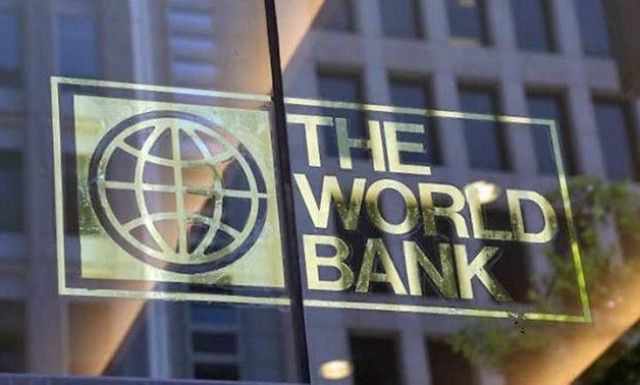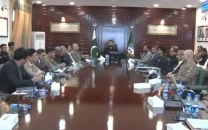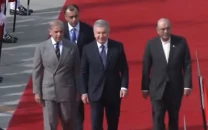Govt seeks $400m loan from World Bank
Lender plans to bring reforms in tax administration, tax policy simultaneously

The logo of the World Bank. PHOTO: AFP
The Federal Board of Revenue (FBR) and the WB are negotiating the $400 million that attaches conditions like setting up a constitutional body to resolve tax disputes between the Centre and the provinces, according to the government sources.
It also seeks change in tax structure for the agriculture sector, which is a contentious issue due to strong influence of landlords on economic policymaking.
But the Economic Affairs Division has not yet made a formal request for the loan, although FBR and the WB have covered significant ground during past few months.
FBR increases property valuation by average 20%
Initially, the size of the proposed programme was $285 million.
If cleared by its board, it will be the second full-scale attempt by the WB to reform the FBR in the past 14 years. Its earlier $150 million worth of Tax Administration Reforms Project badly failed to yield the desired results and the money went down the drain.
Like the last package, the WB is again planning to bring reforms in tax administration and tax policy simultaneously. As a result of these reforms, the FBR's workforce at headquarter may be slashed by nearly 20 per cent, according to the sources who are involved in loan consultations.
For over two years, the WB has suspended approvals of new policy loans due to deterioration in Pakistan's macroeconomic indicators. One of the conditions for qualifying for the policy loan is to have official foreign currency reserves sufficient to finance minimum two and half months of imports. Pakistan does not fulfil this condition.
The programme for result financing, known as PfR, is a hybrid financing instrument that could be used to extend the $400 million loan.
PM Imran orders crackdown as corrupt FBR official promoted
The WB is emphasising upon development of a tax policy framework that also supports harmonisation of provincial taxes. One of the conditions of the loan is setting up a constitutional body – the National Tax Council – to solve issues between the Centre and the four federating units.
The Washington-based lender is seeking common policy and administration for sales tax and income tax aimed at ending overlapping of policies of federal and provincial revenue authorities.
The separation of tax policy from the FBR's administration has also been embedded in the policy matrix, although the federal cabinet has already approved it.
The WB estimates Pakistan's tax gap at 10 per cent of the Gross Domestic Product or Rs3.8 trillion, which is equal to 100 per cent of last year's revenue collection.
Pakistan's current tax-to-GDP ratio is 12.6 per cent of the GDP, which according to the WB should be 23 per cent of the GDP.
However, the independent experts believe that given the FBR's administrative challenges and non-compliant tax culture, the true tax potential is not more than 17 per cent of the GDP. This means Pakistan is still losing Rs1.7 trillion revenue annually due to corruption, leakages and poor capacity.
The sources said the WB was also arguing to shift from profit-based income tax to turnover taxation. They said that the lender was claiming that it could reduce tax evasion by around two-thirds by the corporate sector.
The WB is also asking for changing tax structure for the agriculture sector. Currently, the agriculture sector’s tax is collected on the basis of holding and income by the provinces. The lender wanted to introduce presumptive taxation on the turnover basis, according to the sources.
There was also a proposal to integrate sales tax collection on goods and services on Indian model but this may face resistance from provinces. There is a strong view that provincial governments are underperforming on tax collection when compared to the federal government.
Among the 13 federal countries, Pakistan is second to last on the performance of provincial governments on tax collection. While the services sector accounts for 56 per cent of the GDP, it contributes only 0.5 per cent of the GDP to the taxes and about 11 per cent to the sales tax collection.
The issue of withdrawing remaining sales tax exemptions also came under discussions during talks with the WB local office, the sources said.
The WB analysis is that Pakistan has a complex tax system of over 70 unique taxes and at least 37 government agencies administer these taxes.
Through $400 million lending, the WB is keen to help Pakistan develop a long term tax policy. But there are concerns that the money may ago be spent on building new office buildings and procuring furniture as had happened with the TARP.
The WB is also pushing for decisively moving towards a functional organisational structure to overcome current fragmentation and inefficiencies in the FBR.
It is of the view that the functional system permits standardisation of similar processes across all taxes and facilitates simplification of procedures.



















COMMENTS
Comments are moderated and generally will be posted if they are on-topic and not abusive.
For more information, please see our Comments FAQ